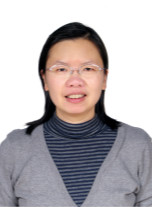
Professor
Institute of Physical Electronics
Research Interests: Nanoscience and nanotechnology, materials science, electron microscopy
Office Phone: 86-10-6275 7555
Email: qingchen[at]pku.edu.cn
Chen, Qing is a professor in School of Electronics, Peking University since 2002 and has served as the Director of Institute of Physical Electronics since 2011. She has also served as the Vice Director of Key Laboratory for the Physics and Chemistry of Nanodevices, Ministry of Education in China since 2003. She obtained her B.Sc. from Peking University in 1988, and Ph.D. from University of Science and Technology Beijing in 1994. She has been studying or working for at least one year in Cambridge University in UK, Institute of Metal Materials in Japan and Arizona State University in USA before she came back to Peking University in 2001. Her current research interests include nanodevices based on inorganic semiconducting nanotubes, nanowires and 2D nanomaterials; the relationship between the properties of nanomaterials and nanodevices and their structures; andin situelectron microscopy.
Prof. Chen has published more than 200 SCI papers in peer-reviewed journals, which have been cited by others for over 11,000 times, with h-index being 46 by September 2020. She was awarded Thomson Reuters Research Fronts Award (2008) and State Natural Science Award Second Class (2010), and has won Outstanding Youth Fund from National Natural Science Foundation of China (2009).
Prof. Chen has more than ten research projects, including NSFC, 973 programs, 863 project, etc. Her research achievements are summarized as follows:
1) The structure and growth mechanism of titanate nanotubes: Titanium oxide and titanate nanostructures have great potential in clean energy and environmental protections. Based on extensive electron microscopy observations and quantitative simulations and fitting of experimental data, she proved that the previously proposed TiO2nanotube model by other researchers is in correct. Instead, she proposed a new scroll type nanotube structure model based on layered H2Ti3O7structure and the model has been confirmed experimentally by her group and many other researchers around the world. She and her colleges have also proved that the previously proposed two-step growth mechanism for the nanotube is wrong and have furthermore established an one-step growth model. The models on the nanotube structure and growth have promoted further studies and applications of titanium oxide and titanate nanomaterials.
2) In situ electron microscopy: Understand the relationship between the structure and the properties is fundamentally important for the study and applications of materials. To probe such relationship for nanomaterials is a great challenge. Prof. Qing Chen and her colleagues have developed various nanocharacterization, nanomeasurement, nanomanipulation and nanofabrication methods based on in situ electron microscopy. They have further studied the mechanical, electronic, photoelectronic and sensing properties of individual nanotubes and nanowires, and correlated the properties with the structures of the nanomaterials.
3) Nanodevices: nanodevices based on nanotubes, nanowires and 2D nanomaterials have great potential in many fields. Prof. Qing Chen and her colleagues have fabricated nanoelectronic devices and nano photoelectronic devices based on nanotubes (such as carbon nanotubes), nanowires (such as InAs nanowires) and 2D nanomaterials (such as MoS2). They have studied how the devices performance changes with the structure and orientation of the nanomaterials, the contact properties, the dielectric layers and environmental gases. Their results are very important for developing high performance nanodevices.




